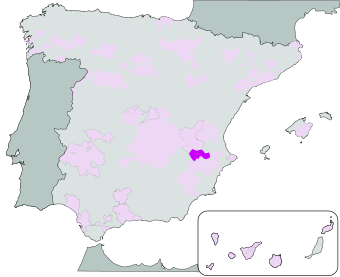Almansa (DO) facts for kids
| Wine region | |

Almansa DOP in the province of Albacete in the region of Castile-La Mancha
|
|
| Official name | D.O.P. Almansa |
|---|---|
| Type | Denominación de Origen Protegida (DOP) |
| Year established | 1966 |
| Country | Spain |
| Size of planted vineyards | 7,200 hectares (17,792 acres) |
| No. of wineries | 12 |
| Wine produced | 39,841 hectolitres |
| Comments | Data for 2016 / 2017 |
Almansa is a special wine region in Spain. It is known for making delicious red wines. This area is called a Denominación de Origen Protegida (DOP). This means its wines have a special quality and come from a specific place.
Almansa is located in the southeast of the Albacete province. This part of Spain is called Castile-La Mancha. It's a place where the high central plains meet the Mediterranean Sea. The grape farms, called vineyards, are mostly around towns like Almansa, Alpera, and Higueruela.
Contents
History of Almansa Wines
Ancient Times and Borders
Long ago, in the Middle Ages, Almansa was a border area. It was where the lands of the Moorish people and the Christian kingdoms met. This made the region very important.
Almansa Castle
The famous Almansa Castle was built by the Moors. It helped protect the Vinalopó Valley. This valley was a long-standing border between the Christian kingdoms. These kingdoms were Castile and Aragón.
Climate for Grape Growing
Weather in Almansa
The climate in Almansa is called "continental." This means it has very hot summers and cold winters. It doesn't rain much here, only about 350 mm each year.
Rainfall and Temperatures
Rain usually falls in spring and autumn. Sometimes, it comes as strong storms, which can even bring hail. Summer temperatures can reach 38°C (100°F). In winter, it can get as cold as -6°C (21°F). This weather helps the grapes grow well.
Soil Conditions
Vineyard Location
Most of the vineyards in Almansa are on flat land. They are located quite high up, between 700 and 1000 meters (about 2,300 to 3,300 feet) above sea level.
Soil Type
The soil is mostly made of lime. It lets water pass through easily, which is good for grapevines. The soil also doesn't have many nutrients. This makes the vines work harder, which can lead to more flavorful grapes.
Grape Varieties
Red Grapes
Many different types of grapes are allowed to be grown here. The main red grape varieties are:
White Grapes
The main white grape varieties are:
- Verdejo
- Chardonnay
- Sauvignon blanc
- Moscatel de Grano Menudo
Vineyard Density
The grapevines are planted with a maximum density. This means there are no more than 1,600 vines in one hectare of land.
See also
 In Spanish: Almansa (vino) para niños
In Spanish: Almansa (vino) para niños
 | Janet Taylor Pickett |
 | Synthia Saint James |
 | Howardena Pindell |
 | Faith Ringgold |

